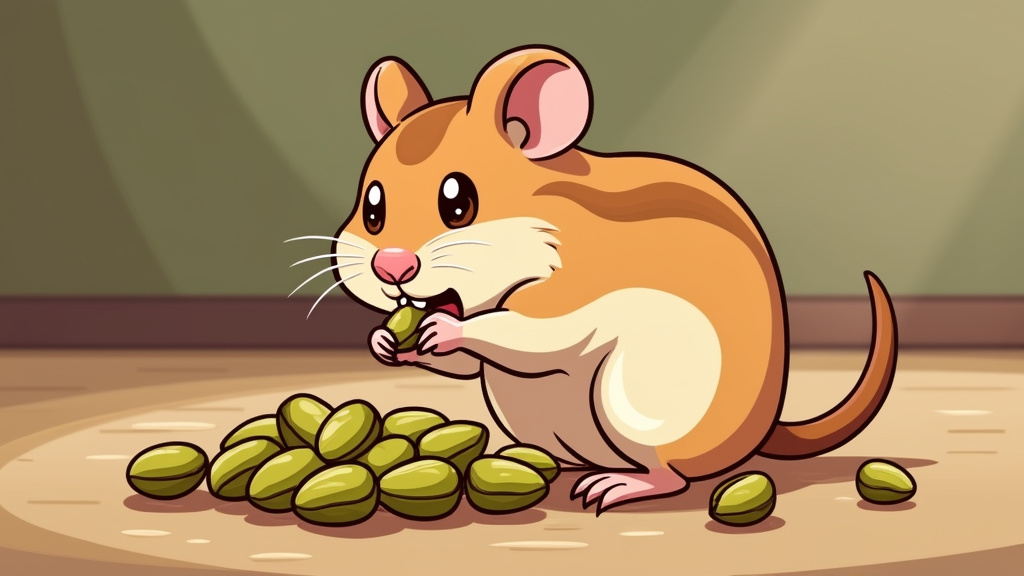When it comes to hamster treats, variety is essential. While pistachios are a safe option in small quantities, it’s important to explore other nutritious alternatives. A diverse diet ensures that your hamster gets a balance of vitamins, minerals, and proteins while also preventing boredom with their food. Safe and nutritious treats, offered in moderation, can enhance your hamster’s health and happiness, making this exploration of pistachio alternatives essential for any pet owner.
Fresh Fruits and Vegetables
Apples:
Apples are a great source of vitamin C and can provide a refreshing, crunchy treat for your hamster. However, it’s crucial to remove the seeds and peel the apple before offering it to your pet, as the seeds contain small amounts of cyanide, which can be harmful. A small, seed-free piece of apple can be an occasional sweet treat packed with nutritional benefits.
Carrots:
Carrots are another hamster favorite, known for their fiber content and low-calorie profile. They support digestive health and can help keep your hamster’s teeth in check. Offer small slices or shavings of carrot to avoid overfeeding, as too much can lead to digestive issues due to the fiber content.
Cucumbers:
With their high water content, cucumbers are an excellent hydrating treat for your hamster. Low in calories, cucumbers can be given in small chunks, helping to refresh your pet while adding variety to their diet. However, be cautious not to overfeed as too much water content can sometimes cause diarrhea.
Leafy Greens:
Leafy greens like romaine lettuce, kale, and spinach are excellent sources of vitamins and minerals. They are also rich in fiber, which supports digestion. When offering leafy greens, make sure they are thoroughly washed to remove any pesticides, and always serve in moderation to avoid potential bloating or digestive discomfort.
Whole Grains
Oats:
Plain oats are a fiber-rich treat that can support your hamster’s digestive health. They are a natural, unprocessed food that hamsters enjoy nibbling on. A small pinch of plain oats mixed into their regular diet can provide a healthy source of fiber without overloading them on calories.
Whole Wheat Bread:
Whole wheat bread, offered in tiny portions, can also be a safe snack for hamsters. However, it’s crucial to ensure that the bread is free from added sugars, preservatives, or artificial ingredients, which can be harmful. A small bite-sized piece of whole wheat bread once in a while can provide fiber and energy without the risks associated with processed food.
Lean Proteins
Cooked Chicken or Turkey:
Hamsters can benefit from small amounts of lean protein, and plain, cooked chicken or turkey is a great option. Avoid any seasoning, oils, or fats, and serve only a pea-sized piece to prevent digestive upset. Protein-rich treats like this can support muscle health and keep your hamster energized.
Eggs:
Scrambled or hard-boiled eggs are another safe, protein-rich option for hamsters. Eggs provide essential vitamins like B12 and healthy fats, making them an occasional nutrient boost. As always, moderation is key—offer a pea-sized amount once or twice a week to ensure your hamster gets the benefits without overloading on protein.
Nuts (in Moderation)
Cashews:
Unsalted cashews can serve as an occasional treat, but due to their high fat content, they should only be offered about once a week. Cashews provide healthy fats and proteins, but overfeeding can lead to obesity or digestive problems. A small piece, no bigger than your hamster’s paw, is all they need to enjoy the benefits without the risks.
Walnuts:
Walnuts are similarly high in fat and should be given sparingly. They are rich in beneficial fats and antioxidants but can easily contribute to weight gain if overfed. A small piece of walnut, offered once a week, is enough to provide variety without affecting your hamster’s overall health.
Peanuts:
Unsalted peanuts are safe for hamsters in very limited quantities. Like other nuts, they are high in fat, so limit your hamster to just one peanut per week. Always ensure the peanut is unsalted and free from added oils or flavorings, as these can be harmful to your pet.
Important Considerations
Gradual Introduction of New Foods:
When introducing new treats into your hamster’s diet, it’s important to do so gradually. Start with small amounts and observe your hamster for any adverse reactions such as diarrhea or lethargy. This cautious approach helps prevent digestive issues and ensures your hamster can safely enjoy the new additions to their diet.
Portion Control:
Treats should only make up around 5% of your hamster’s overall diet. The bulk of their nutrition should come from a high-quality hamster food mix that provides essential nutrients. Overfeeding treats, even healthy ones, can lead to obesity, diabetes, and other health issues. Keeping portions small and treats infrequent is the key to a balanced diet.
Avoid Harmful Foods:
Certain foods should never be part of a hamster’s diet. Sugary, salty, or processed foods can be extremely harmful, leading to obesity, diabetes, and even heart disease. Chocolate, junk food, and anything containing artificial additives should be avoided at all costs. By sticking to natural, whole foods, you can help your hamster maintain long-term health and vitality.
Conclusion
While pistachios can be a treat option, there are plenty of healthier and safer alternatives for your hamster. Fresh fruits, vegetables, whole grains, lean proteins, and nuts (in moderation) can provide a varied and nutritious diet that keeps your hamster healthy and satisfied. By introducing treats gradually, controlling portion sizes, and avoiding harmful foods, you can ensure your furry friend enjoys a balanced and happy life. A diverse range of treats, offered with care, will contribute to your hamster’s overall well-being, making their diet both enjoyable and nutritious.

